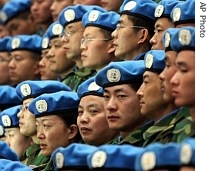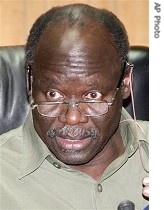2007年VOA标准英语-UN Force for Darfur Faces Challenges(在线收听)
Paris
02 August 2007
The international community has thrown its support behind the United Nations resolution authorizing a 26,000-strong peacekeeping force in Darfur. The force is to be in place by January. But some experts say getting the troops in place will be a difficult task. Anita Elash reports for VOA from Paris.
 |
| Chinese peacekeepers prepare to depart for their UN mission to Sudan, 16 Jan 2007 file photo |
The government of Sudan is accused of arming Arab Janjaweed militiamen against ethnic African rebels, and until this week, it had stalled efforts to deploy a U.N. peacekeeping force. In the end, it accepted a watered down resolution.
Sudan's Foreign Minister, Lam Akol, said although some concerns have not been addressed, it was a good compromise.
 |
| Lam Akol talks to reporters during a press conference in Khartoum, 1 Aug 2007 |
Rodolphe Adada, Joint Special Representative of the U.N. Secretary General was more cautious in his comments.
"Don't forget that the force in itself is not sufficient to bring the peace in Darfur," he noted. "It will be after the agreement we are trying to get between the Darfurians, the work of the political side, this will be basis of the peace and we are there to help implement this peace agreement."
French Foreign Minister Bernard Kouchner, who has made the Darfur issue a priority since taking office May, says he hopes most of the troops will come from Africa, with backup from Asia.
So far, Burkina Faso, Nigeria, Egypt, Cameroon and Ethiopia have pledged to provide troops. Rwanda and Nigeria, whose forces make up the bulk of the AU force in Darfur, have pledged to send more men. Malawi, which has a battalion in the current force, says it is also considering expanding its participation in the Darfur mission.
But analysts say the U.N. could have a hard time putting together such a large contingent.
Roland Marchand is an Africa expert at the Center for the Study of International Relations in Paris. He says many African and Asian leaders believe the United States has overstated the extent of the problem in Darfur, and they will be reluctant to commit troops or equipment. He says he doubts the full force will be in place by January.
"The number of troops which is required is extremely high," he explained. "The second problem is troops on the ground do not mean much, except if they have the equipment to do their job. And again, for the helicopters, for a number of other aspects, is going to be another issue. Every problem has a solution. I'm not saying it's going to be impossible. What I'm saying is it's certainly not going to be as easy as people think today."
Major western powers are expected to provide only limited manpower. So far, only a handful have agreed. France has offered to take part in the chain of command, as well as to help with reconstruction and relief.
Denmark and Indonesia also say they will take part, and the European Union is considering how much it wants to get involved. However, Britain says it will not send ground officers.
Marchand says the peacekeepers could still be hampered by Sudan's government. Although Sudan has agreed to accept the force, there is nothing in the U.N. resolution to stop it from holding up the deployment.
Marchand says another problem is that there is still no political agreement between the warring factions. He says that will eventually put the peacekeepers in danger, and make them ineffective.
"Those troops might have in the very short term a positive impact on the situation on the ground, but in the medium term it's 100 percent sure, I would say even 200 percent sure that those troops are going to be stuck in local conflicts," he added.
According to the U.N. resolution, political talks between the warring factions are to take place this weekend. The first peacekeepers are scheduled to arrive in Darfur in October.